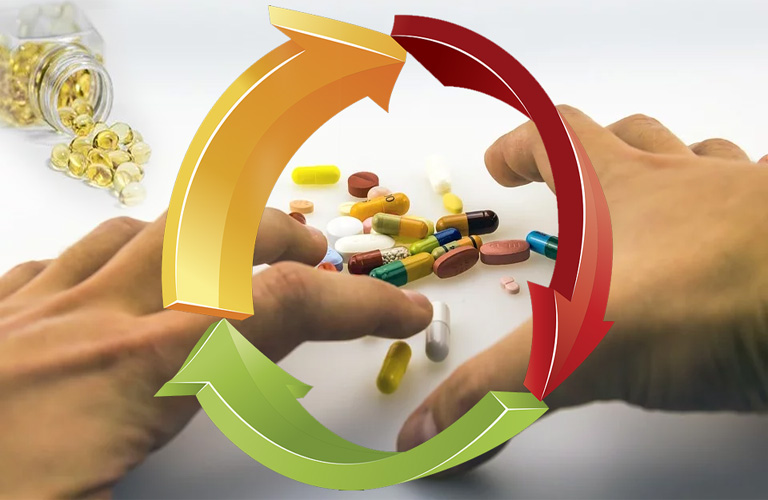Health Articles
How Medications and Supplements Can Interact
When consumers think about drug interactions, they often think about prescription drugs. But some drugs that are available over the counter without a prescription can interact with supplements, too. If you’re considering taking both an over-the-counter drug and a dietary supplement, it’s a good idea to talk with your health care provider or a pharmacist about possible interactions.
Drug-Supplement Interactions are Especially Important:
- When you’re taking a drug that has what health care providers call a "narrow therapeutic range"
- When you’re going to have surgery.
In these situations, it’s particularly important to talk with all of your health care providers about the dietary supplements you’re taking now and any you may be considering taking in the future.
Drugs With a Narrow Therapeutic Range
Having the right amount of certain drugs in your body is crucial. If the amount of the drug is even a little too low or too high, it can cause big problems. Drugs like these are said to have a "narrow therapeutic range" or "narrow therapeutic index."
Examples of Drugs With a Narrow Therapeutic Range:
- Carbamazepine (used to prevent seizures)
- Cyclosporine (used to prevent organ transplant rejection)
- Digoxin (used to treat heart problems)
- Levothyroxine (used to treat thyroid problems)
- Phenytoin (used to prevent seizures)
- Warfarin (an anticoagulant—also called a blood thinner)
If you’re taking a dietary supplement, and your health care provider prescribes a drug with a narrow therapeutic range, you should tell your health care provider that you’re taking the supplement and ask the provider what you should do.
If You’re Going to Have Surgery
If you’re going to have surgery, talk to your health care providers as far in advance of the operation as possible and tell them about all dietary supplements that you’re taking.
Some dietary supplements may cause problems during surgery because:
- They may affect your response to anesthetics or to other medicines that you may be given before, during, or after the operation.
- They may increase your risk of bleeding.
- Some health care providers will ask patients to discontinue all herbal supplements several weeks before having elective surgery (surgery that can be scheduled in advance).
If you’re having an emergency operation, you won’t have a chance to stop taking supplements ahead of time. But it’s still important for you or a family member to tell your surgeon and anesthesia provider about all dietary supplements that you’re taking so that they can be prepared for any problems that might occur.
Browse Pages:
- Health
- Medications and Supplement Interactions
- St. John's Wort Interactions
- Supplements & Anasthesia
- Drug Interactions with Food
- Wellness and Well-Being
- Testing Treatments
- Health Articles
- F.A.Q. Health
- CAM (Complementary & Alternative Medicine)

There are three main types of drug interactions:
- Drugs with food and beverages
- Drugs with dietary supplements
- Drugs with other drugs
Examples of drug interactions with food and beverages:
- Chocolate: Eating chocolate and taking monoamine oxidase (MAO) inhibitors (drugs to treat depression), such as Nardil (phenelzine) or Parnate (tranylcypromine), could be dangerous. Someone who eats an excessive amount of chocolate after taking an MAO inhibitor may experience a sharp rise in blood pressure.
- Licorice: For someone who is taking Lanoxin (digoxin), some forms of licorice may increase the risk for Lanoxin toxicity. Lanoxin is used to treat congestive heart failure and abnormal heart rhythms. Licorice may also reduce the effects of blood pressure drugs or diuretic (urine-producing) drugs, including Hydrodiuril (hydrochlorothiazide) and Aldactone (spironolactone).
- Alcohol: If you are taking any sort of medication, it's recommended that you avoid alcohol, which can increase or decrease the effect of many drugs.
These over-the-counter drugs may interact with herbal supplements:
- Aspirin - A variety of herbs may interact with aspirin to increase the risk of bleeding.
- Pseudoephedrine (a decongestant) - Concentrated green tea supplements interact with pseudoephedrine.
- Fexofenadine (Allegra) - St. John’s wort interacts with fexofenadine (Allegra).
Major risk factors for poor outcomes from drug and supplement interactions include:
- People who use multiple medications and/or supplements
- Older people
- People with inadequate liver or kidney function
- Patients who use medications with narrow therapeutic indexes
- Patients who are going to have surgery
Note: Patients with these risk factors should be also targeted for interventions to prevent drug interactions with vitamins and minerals.
It’s important to tell your health care providers about all the drugs and supplements you take.
What You Should Know
Many people take dietary supplements, over-the-counter drugs, and/or prescription medications. Sometimes, these drugs and supplements may interact in harmful ways. It’s very important to tell all your health care providers about all dietary supplements and drugs you take. That way, they can help you avoid harmful interactions.
Popular herbal supplement St. John’s wort is especially well known for decreasing the effects of many types of drugs. It does this by speeding up the processes in your body that change drugs into inactive substances. This herb may decrease the effectiveness of more than 70 percent of all drugs.
Some supplements may increase the effects and side effects of drugs. For example, the herb schisandra may slow down the processes in your body that change drugs into inactive substances. So if you take this herb while you’re also taking a drug, the amount of the drug in your body may increase. As a result, the drug’s effects may be too strong.
Like schisandra, goldenseal may slow down the processes in your body that change drugs into inactive substances, leading to increases in drug levels in your body.





